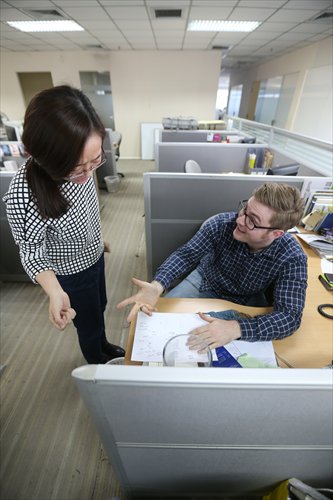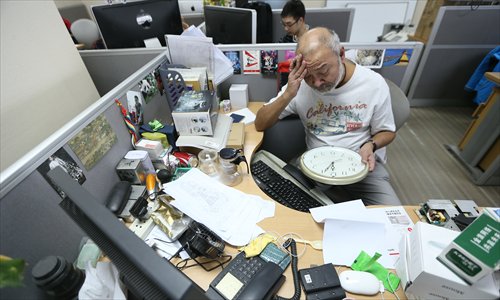Longer hours, differences in office culture and time zones trigger burnout among foreigners working in China

Jobs that involve international communication and multicultural work environments often pose greater challenges as well as more time spent on the clock. Photo: Cui Meng/GT
It's 2 am and Priscilla Martin (pseudonym), a designer from Europe, is hunched over her desk, downing cup after cup of black coffee and pulling at her hair as she struggles to stay awake. She's working on a big project for which her company, a design firm with a branch in Beijing, is currently in the running, and this is her fourth night working late this week. Though Martin says she doesn't mind occasional overtime, days like this are enough to push her to her breaking point.
"What am I doing in here?" she finds herself mumbling. "I should go back home. This kind of overtime would never happen there."
While such long hours might be unthinkable in Martin's home country, they're commonplace in China, which - in keeping with the trends of other developing countries as well as the larger east Asian region - boasts some of the longest working hours in the world. According to a 2014 study by Beijing Normal University, the average Chinese worker puts in 2,000-2,200 hours each year. Compare that to the UK (a country solidly in the middle of the pack in terms of EU working hours), where the average worker puts in 1,677 hours per year. On the other end of the spectrum are Northern European countries like Switzerland and Denmark, which have instituted 33-hour workweeks, which, with four-to-five weeks of vacation, totals around 1,400-1,500 hours a year, according to a 2013 CNN report.
It's expats that are often hit the hardest by China's long working hours, especially for those who come from countries with shorter working hours and more complete labor laws.
Like their Chinese counterparts, foreigners who work in office jobs in China are expected to put in however long it takes to get projects done, often without overtime pay or any other kind of compensation. Foreigners are even less likely to seek legal help, as such an action would likely lead to them being fired and, therefore, losing the work permit that keeps them legally in the country.
China's culture of overwork
Martin has lived in Beijing for eight years, but she says in that time, the constant overtime hasn't gotten any easier.
"I'm still not used to working such long hours," she says. "I could never get used to it."
Martin's sentiments are echoed by Charlotte Friis Lodahl, a longtime Danish expat who works for a phone company. In her 12 years in Beijing, she's observed that long working hours often have more to do with office culture than with actual productivity.
"The funny thing was that when I was the boss at my own company, my Chinese co-workers wouldn't leave until I had left," she says. "Later I understood that it's a custom for them. Nobody leave before the boss."
This is a far cry from the culture in Denmark. "There, if employees work overtime, the boss thinks that they aren't efficient enough in general."
That's because in Denmark, the workday is more concentrated, which means shorter hours and more off-time. According to a 2013 report by CNN Money, Danish workers average 33 hours per week, and are afforded five weeks of vacation per year. That doesn't seem to have hurt them; the country boasts the 12th most competitive economy in Europe according to the 2015-2016 Global Competitiveness Report, and was named the best country for business by Forbes in 2015.
"In Denmark, we work non-stop the whole day, and we don't socialize with each other," Lodahl says. "The lunch break is only half an hour, and everybody just eats at their own desk to save time and get their work done, so they can get off in time."
In China, by contrast, Lodahl sees a lot of wasted time. "Here, we are given an hour-and-a-half lunch break. I don't even know what to do with all that time, and my colleagues take breaks during the day and talk in the coffee room, or browse websites. A lot of efficiency is lost in here."
The lack of complete and transparent laws, as well as government bureaucracy, can also play a role in lower working efficiency, according to Mary Peng, the founder of Beijing's International Center for Veterinary Services.
"In my hospital, we've had officials suddenly come in and say we need to apply for more licenses, which requires more equipment and renovation, and then we have to schedule a time for the examination, which can take months. With things like that, our efficiency is definitely slowed down."

Like locals, expats in China are often required to work unpaid overtime, and have few legal options for seeking compensation. Photo: Cui Meng/GT
International communications extend the workday
But longer working hours in China aren't always the result of inefficiency or a brown-nosing office culture; they're also a feature of challenging international work environments.
"Beijing is a multinational environment," Lodahl says. "We work with people from all around the world, so of course the job will be more challenging, and mean more time."
In practical terms, that means working not only Chinese office hours, but also those of Europe, the US and beyond.
Lodahl says she often has meetings in Beijing during the day, communicates with colleagues or clients in Europe in the evening, and takes conference calls with the US as early as 4 am.
"I remember that I was still having conference calls with the US office in the middle of the night when I was eight months pregnant six years ago," she said.
Zhang Weibo, a partner at the Beijing Yingke Law Firm who specializes in expat legal disputes in China, explained that most international companies that employ expats in Beijing are headquartered in Europe or the US, and that the Beijing office must accommodate the schedule of headquarters.
Zhang said that in contrast to Chinese people, whose awareness about labor laws is fairly low, the growing number of expats coming to China to work are more likely to be involved in labor disputes.
"I have noticed that there are more law firms in Beijing that focus on labor disputes among expat employees," he said.
Lodahl recalls instances while working at the office in Beijing that she called colleagues in Europe asking for files, and they would answer, "It's 4 pm, I am done. Call me tomorrow."
Protecting workers' rights
While go-getters like Lodahl may be happy to work extra hours, for others, like American Marck Ernest Thornton, China's lax labor laws and disregard for employee rights are a disincentive to work here - so much so that Thornton, who lived in Beijing for five years, recently left for Germany.
He recalls that back in 2011, when he first started working for a Chinese education company, the boss asked him to work twice the amount of time stipulated in his contact for no extra pay because the whole company was taking the next week off.
"I said no, but the boss told me I had no choice," he says.
Zhang says that there's no doubt China's working environment is not ideal for expats - despite the fact that they are covered by the country's labor laws, which stipulate that workers shall receive 150 percent of their salary for each hour of overtime, 200 for weekends and 300 for national public holidays.
"The problem is that most expats wouldn't resort to legal support, because it may cost them their jobs," said Zhang, "In China, in order to work, expats have to get a work permit from the company, and if the employee sues the company, the company will most likely revoke the permit."
Another problem is that, among all the labor dispute cases that commonly arise, unpaid overtime is the most difficult one to prove, since companies are the ones who keep attendance records.
Zhang recommends that expat employees who want to be compensated for their overtime keep photos of their overtime applications or hold on to e-mails and get them notarized.
He added that there are legal aid centers in every district in Beijing, and that many accept cases from expats.
"I know many expats who've left China because of the stress and the hours. I think the government needs to educate employers and employees more about labor laws and build better working environments to attract more foreign and local talent," Thornton said.
Newspaper headline: Overworked!